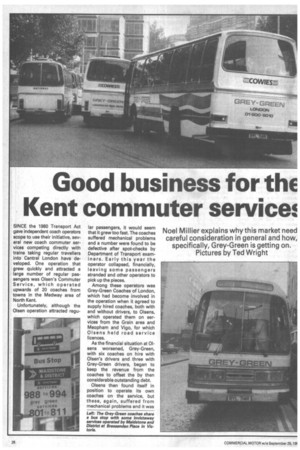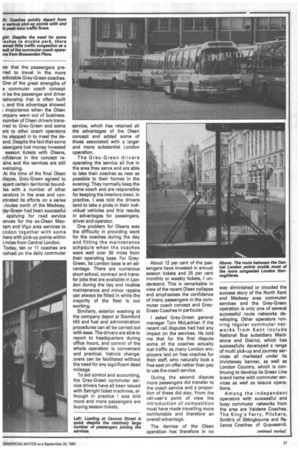Good business for the Kent commuter service!
Page 22

Page 23

If you've noticed an error in this article please click here to report it so we can fix it.
SINCE the 1980 Transport Act gave independent coach operators scope to use their initiative, several new coach commuter services competing directly with trains taking regular travellers into Central London have developed. One operation that grew quickly and attracted a large number of regular passengers was Olsen's Commuter Service, which operated upwards of 20 coaches from towns in the Medway area of North Kent.
Unfortunately, although the Olsen operation attracted regu lar passengers, it would seem that it grew too fast. The coaches suffered mechanical problems and a number were found to be defective after spot-checks by Department of Transport examiners. Early this year the operator collapsed, financially, leaving some passengers stranded and other operators to pick up the pieces.
Among these operators was Grey-Green Coaches of London, which had become involved in the operation when it agreed to supply hired coaches, both with and without drivers, to Olsens, which operated them on services from the Grain area and Meopham and Vigo, for which Olsens held road service licences.
As the financial situation at 01sens worsened, Grey-Green, with six coaches on hire with Olsen's drivers and three with Grey-Green drivers, began to keep the revenue from the coaches to offset the by then considerable outstanding debt.
Olsens then found itself in position to operate its own coaches on the service, but these, again, suffered from mechanical problems and it was )ar that the passengers prerred to travel in the more edictable Grey-Green coaches. One of the great strengths of e commuter coach concept n be the passenger and driver lationship that is often built ), and this advantage showed importance when the Olsen impany went out of business. number of Olsen drivers transrred to Grey-Green and some ant to other coach operators ho stepped in to meet the deand. Despite the fact that some issengers lost money invested season tickets with Olsens, Infidence in the concept reains and the services are still veloping.
At the time of the final Olsen illapse, Grey-Green agreed to spect certain territorial boundies with a number of other )erators in the area and conIntrated its efforts on a series routes north of the Medway. rev-Green had been successful applying for road service ;ences for the ex-Olsen Meolam and Vigo area services to )ndon together with some :hers with pick-up points within ) miles from Central London. Today, ten or 11 coaches are volved on the daily commuter service, which has retained all the advantages of the Olsen concept and added some of those associated with a larger and more substantial London operation.
The Grey-Green drivers operating the service all live in the area they serve and are able to take their coaches as near as possible to their homes in the evening. They normally keep the same coach and are responsible for keeping the interiors clean. In practice, I was told the drivers. tend to take a pride in their individual vehicles and this results in advantages for passengers, driver and operator.
One problem for Olsens was the difficulty in providing work for the coaches during the day and fitting the maintenance schedule when the coaches were well over 30 miles from their operating base. For GreyGreen, its London base is an advantage. There are numerous short school, contract and transfer jobs that are available in London during the day and routine maintenance and minor repairs can always be fitted in while the majority of the fleet is out working.
Similarly, exterior washing at the company depot at Stamford Hill and fuel and administration procedures can all be carried out with ease. The drivers are able to report to headquarters during office hours, and control of the whole operation is convenient and practical. Vehicle changeovers can be facilitated without the need for any significant dead mileage.
To aid control and accounting, the Grey-Green commuter service drivers have all been issued with Setright ticket machines, although in practice I was told more and more passengers are buying season tickets. About 12 per cent of the passengers have invested in annual season tickets and 25 per cent monthly or weekly tickets, I understand. This is remarkable in view of the recent Olsen collapse and emphasises the confidence of many passengers in the commuter coach concept and GreyGreen Coaches in particular.
I asked Grey-Green general manager Tom McLachlan if the recent rail disputes had had any impact on the services. He told me that for the first dispute some of the coaches actually lost traffic as many London employers laid on free coaches for their staff, who naturally took a free seat on offer rather than pay to use the coach service.
During the second dispute more passengers did transfer to the coach service and a proportion of these did stay. From the rail-user's point of view the introduction of competition must have made travelling more comfortable and therefore an overall advantage.
The demise of the Olsen operation has therefore in no way diminished or clouded the success story of the North Kent and Medway area commuter services and the Grey-Green operation is only one of several successful route networks developing. Other operators running regular commuter networks from Kent include National Bus subsidiary Maidstone and District, which has successfully developed a range of multi pick-up and journey services all marketed under its Invictaway banner, as well as London Country, which is continuing to develop its Green Line brand name with commuter services as well as leisure operations.
Among the independent operators with successful and busy commuter i-ietworks from the area are Valdene Coaches, The King's Ferry, Pilchers, Smith's of Sittingboume and Reliance Coaches of Gravesend.












































